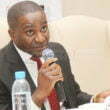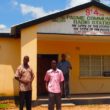Northern Province Minister Lazarous Chungu has called on politicians to stop using tribal talk as a political stepping because it is a divisive trend.
And the Zambia Conference of Catholic Bishops (ZCCB) secretary general Fr Cleophas Lungu has distanced the Church from the tribal remarks that were made on the Catholic-owned radio station in Kasama.
Meanwhile, the Independent Broadcasting Authority (IBA) has with immediate effect suspended the broadcasting license for Lutanda Radio of Northern Province for 30 days.
Speaking when they featured on Kasama’s Lutanda Radio, Abraham Mulenga and John Sampa issued disparaging remarks against Tonga-speaking people and the UPND, causing an outrage from stakeholders after audios went viral on social media.
“If you look at the way our friends vote, the UPND in Southern Province, they do 100 per cent plus! Here, UPND gets maybe 20 to 30 per cent; PF, here, passes by say 85 per cent, we don’t segregate here, but they segregate even in the way they vote, what type of people are they? They will only rule when their sickness of tribalism heals! I have lived in Tongaland and I stayed there for a week, I wanted to see their way of life. When you find the five of them, when they hear you have a Bemba name, even if you speak English or Nyanja, they won’t pay attention and speak their own language, which you can’t understand. So, it occurred to me that once you introduce yourself to be Bemba from Northern Province, they can’t speak a language you can understand, no! That’s we are saying that Tongas are segregative, you can’t work together with them. We are not talking about civil servants, we are talking about the political party, UPND, which is Tonga-driven,” said John during the radio programme.
But in an interview, Chungu said that Zambians needed to be wise in the way they used their freedom of expression to avoid peddling divisions in the country.
“…And we also need, as Zambians, to use the freedom of expression properly, correctly and responsibly, even the freedom of speech, we should use it properly because we owe it to the Zambian people. Generally speaking, talking on tribal lines is unacceptable, is uncalled for, and is unrealistic. All of us must try as much as possible to unite the country as per our motto of ‘one Zambia, one nation,’ and, therefore, I can only urge those that have the propensity to use tribe as a political stepping stone, it’s not good and it’s unacceptable because we are one and the same. However, it is acceptable for me to talk on political lines because I have to explain and expound the vision of the Patriotic Front, I have to tell the people what the PF is doing, I have to be able to tell people the vision of the Patriotic Front. So, I can talk on political lines because I believe in the Patriotic Front, and so others believe in other political parties, it doesn’t matter,” Chungu said.
And he pledged that once he verified that the two were PF members, he would ensure that they were disciplined by the party in the province.
“I haven’t listened to that audio and for me to comment meaningfully, I need also to have an opportunity to hear what they said, but I also need to establish whether or not they are party officials, or they are party members. You know, we are not a card-carrying party; we don’t have cards to say, ‘yes, this is a member,’ anyone will wake up and throw anything in the air and purport to be PF, you get my point? So, it’s difficult to deal with such individuals. However, once we get the names, we will trace them and if they are, they will confess to say, ‘yes, we are PF and we will caution them. We may not discipline them, but we will educate them; we will tell them: ‘look, this kind of talk is bad and as a party we don’t believe in tribal politics, you need to stop.’ We will counsel them, we will guide them because they may have been excited at having access to radio and they want to say anything,” said Chungu.
“So, discipline does not only mean serving suspension or whatever, no. I can discipline somebody by way of guiding and counselling and bringing to the attention of that particular individual that is wrong. Somebody who is reasonable will go home and think through and say, ‘well this is wrong and I need to refrain from doing this.’ So, we will establish the truth.”
And Fr Lungu noted that the remarks made did not in any way represent the views of the Catholic Church.
“We can hasten to say that any form of tribalism, any form of nepotism, any form of hate speech does not sit well with our faith and moral values as a Catholic Church. And we cannot say that those people who were speaking in a manner that disparages and brings ill feelings to one tribe or another, they do reflect the opinion of the Catholic Church, not at all! They do not. So, be certain that what was reportedly said is not the views of the Catholic Church, but the personal views of those people,” said Lungu.
“With regard to the unfortunate hate speech being aired in one of our Catholic stations, I can confirm that we have engaged with authorities in the Archdiocese of Kasama and we are yet to get a full update on what really transpired. But I can only say that, be patient with us; we don’t want on one hand to speak on behalf of an institution we are not running as a Bishops Conference so the right people to comment would be the Archdiocese of Kasama.”
Meanwhile, the IBA suspended Lutanda Radio’s broadcasting license.
In a statement, Friday, IBA Director General Josephine Mapoma noted that the unprofessional conduct which Lutanda Radio engaged in posed a risk to national peace and security.
“The decision to suspend the license was made following an emergency Board meeting held at the IBA today. Prior to this, the Radio Station was given an opportunity to be heard during a hearing held on 15th November, 2019, in which it admitted its unprofessional conduct. After conducting its investigations and analyzing the recordings, the Authority found the following breaches: Airing a program deemed to promote tribalism and hate speech. The guests, together with the presenter of the programme, were mentioning individual names (Hakainde Hichilema) and a particular ethnic group (Tongas) by passing derogatory, demeaning and tribal remarks likely to result into disorder and disrupt the peace of the public. This was in breach of Section 33 of the Principal IBA Act of 2002 which stipulates that … ‘every licensed broadcasting service, shall develop a code of professional standards which shall have respect for human dignity and rights and freedoms, and contribution to the tolerance of different opinions and belief’,” Mapoma stated.
“In addition, the station was deemed to have breached the provision of the IBA Act which discourages programming that can threaten the public safety, security, peace, welfare or good order. The Authority also found that the Station had violated Regulation No. 3.2.1 of the Standard Operating Procedure (SOP) which states: material likely to encourage or incite the commission of crime or to lead to disorder must not be included in broadcasting services. II. Failure to the moderate a programme. The Authority found that the moderator appeared to be perpetuating the discussion based on tribe instead of curtailing the debate. III. Failure to follow guidelines provided for a Religious Broadcasting Station. The Station aired a political program which is not in line with the License category which is a violation of the provision of the IBA Act. The IBA ACT has stipulated the type of content expected to be broadcast by a Religious Radio Station.”
She stated that Lutanda Radio may appeal against the decision of the board to the Minister of Information within 30 days pursuant to section 31(1) of the IBA Amendment Act of 2010 which provides that “a person who is aggrieved with the decision of the Board under this part may appeal to the Minister within 30 days”.
“During the suspension, the Station is expected to engage qualified and professional staff, conduct in-house training on basic journalism ethics, programme moderation skills, script writing and ethical broadcasting. The suspension has been done under Section 29 (1) (J) of the IBA Amendment Act of 2010 which prescribes that the ‘Board may cancel a broadcasting licence if the cancelation is necessary in the interest of peace and security, welfare or good order’. In addition, it has also been done under Section 29 (1) (k) of the IBA Amendment Act of 2010 which provides that, ‘The Board may suspend a broadcasting licence if it considers it appropriate in the circumstances of the case to do so’,” stated Mapoma.
“The Authority wishes to appeal to all broadcast stations to be careful in the way they handle programmes. Broadcast stations must operate in accordance with the existing broadcasting regulations and guidelines…The Authority will not hesitate to take action against any broadcaster found to be unprofessional in their conduct. The IBA remains committed to ensuring a professional and ethical broadcast media sector in Zambia in accordance with the IBA Act.”












